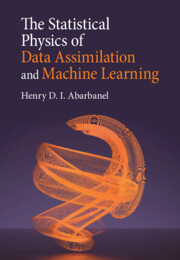2080 results in Statistical Physics
Index
-
- Book:
- The Statistical Physics of Data Assimilation and Machine Learning
- Published online:
- 27 January 2022
- Print publication:
- 17 February 2022, pp 183-188
-
- Chapter
- Export citation
9 - Two Examples of the Practical Use of Data Assimilation
-
- Book:
- The Statistical Physics of Data Assimilation and Machine Learning
- Published online:
- 27 January 2022
- Print publication:
- 17 February 2022, pp 140-171
-
- Chapter
- Export citation
10 - Unfinished Business
-
- Book:
- The Statistical Physics of Data Assimilation and Machine Learning
- Published online:
- 27 January 2022
- Print publication:
- 17 February 2022, pp 172-173
-
- Chapter
- Export citation
7 - Monte Carlo Methods
-
- Book:
- The Statistical Physics of Data Assimilation and Machine Learning
- Published online:
- 27 January 2022
- Print publication:
- 17 February 2022, pp 95-118
-
- Chapter
- Export citation
3 - SDA Variational Principles
-
- Book:
- The Statistical Physics of Data Assimilation and Machine Learning
- Published online:
- 27 January 2022
- Print publication:
- 17 February 2022, pp 14-25
-
- Chapter
- Export citation
5 - Annealing in the Model Precision R f
-
- Book:
- The Statistical Physics of Data Assimilation and Machine Learning
- Published online:
- 27 January 2022
- Print publication:
- 17 February 2022, pp 47-65
-
- Chapter
- Export citation
1 - A Data Assimilation Reminder
-
- Book:
- The Statistical Physics of Data Assimilation and Machine Learning
- Published online:
- 27 January 2022
- Print publication:
- 17 February 2022, pp 1-4
-
- Chapter
- Export citation
Contents
-
- Book:
- The Statistical Physics of Data Assimilation and Machine Learning
- Published online:
- 27 January 2022
- Print publication:
- 17 February 2022, pp v-viii
-
- Chapter
- Export citation
6 - Discrete Time Integration in Data Assimilation Variational Principles: Lagrangian and Hamiltonian Formulations
-
- Book:
- The Statistical Physics of Data Assimilation and Machine Learning
- Published online:
- 27 January 2022
- Print publication:
- 17 February 2022, pp 66-94
-
- Chapter
- Export citation
Bibliography
-
- Book:
- The Statistical Physics of Data Assimilation and Machine Learning
- Published online:
- 27 January 2022
- Print publication:
- 17 February 2022, pp 174-182
-
- Chapter
- Export citation
Frontmatter
-
- Book:
- The Statistical Physics of Data Assimilation and Machine Learning
- Published online:
- 27 January 2022
- Print publication:
- 17 February 2022, pp i-iv
-
- Chapter
- Export citation
2 - Remembrance of Things Path
-
- Book:
- The Statistical Physics of Data Assimilation and Machine Learning
- Published online:
- 27 January 2022
- Print publication:
- 17 February 2022, pp 5-13
-
- Chapter
- Export citation
4 - Using Waveform Information
-
- Book:
- The Statistical Physics of Data Assimilation and Machine Learning
- Published online:
- 27 January 2022
- Print publication:
- 17 February 2022, pp 26-46
-
- Chapter
- Export citation
8 - Machine Learning and Its Equivalence to Statistical Data Assimilation
-
- Book:
- The Statistical Physics of Data Assimilation and Machine Learning
- Published online:
- 27 January 2022
- Print publication:
- 17 February 2022, pp 119-139
-
- Chapter
- Export citation

The Statistical Physics of Data Assimilation and Machine Learning
-
- Published online:
- 27 January 2022
- Print publication:
- 17 February 2022
Contents
-
- Book:
- Classical and Quantum Statistical Physics
- Published online:
- 06 January 2022
- Print publication:
- 20 January 2022, pp v-viii
-
- Chapter
- Export citation
9 - Magnetism in Matter, I
- from Part I
-
- Book:
- Classical and Quantum Statistical Physics
- Published online:
- 06 January 2022
- Print publication:
- 20 January 2022, pp 193-206
-
- Chapter
- Export citation
14 - The Approach of Equilibrium
- from Part II
-
- Book:
- Classical and Quantum Statistical Physics
- Published online:
- 06 January 2022
- Print publication:
- 20 January 2022, pp 315-335
-
- Chapter
- Export citation
References
-
- Book:
- Classical and Quantum Statistical Physics
- Published online:
- 06 January 2022
- Print publication:
- 20 January 2022, pp 362-364
-
- Chapter
- Export citation
11 - The 2D Ising Model
- from Part II
-
- Book:
- Classical and Quantum Statistical Physics
- Published online:
- 06 January 2022
- Print publication:
- 20 January 2022, pp 245-254
-
- Chapter
- Export citation

